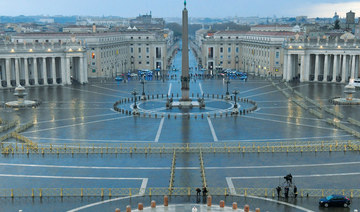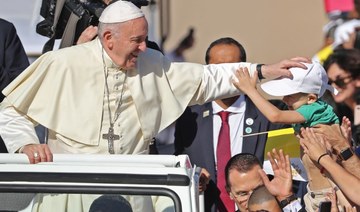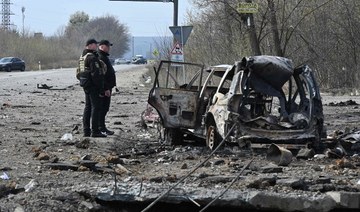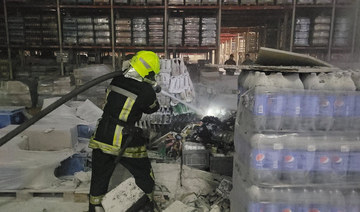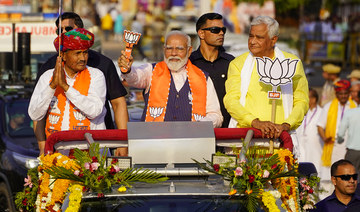CHICAGO: Arab American Christians are preparing to celebrate Easter, one of their most important religious holidays, under a cloud of concern caused by a combination of the deadly coronavirus pandemic and Internet connectivity issues.
A study by personal finance website WalletHub found that only half of American Christians who went to church for Easter services last year intended to try to attend Easter services this year.
Arab American Christian leaders say many of their parishioners will also stay at home and follow holy week services via the Internet.
Restrictions required to stop the spread of the coronavirus disease (COVID-19), notably social distancing and stopping at home, have placed huge constraints on the Arab Christian faithful, who unofficially number about 3 million.
Many churches have announced they would be closed for services on their premises.
“We are struggling like everyone in this pandemic,” said Pastor Hesham Shehab of Salam Christian Fellowship church, based in Lombard, Illinois, a suburb of Chicago.
“We have joined with another American Christian pastor and we do a bilingual service in English and Arabic for our three churches together.”
In common with people of other faiths, including Jews who are celebrating Passover this week, and Muslims who will soon mark the holy month of Ramadan, most of Easter religious services for Arab Christians are being conducted over the Internet with the help of the video and audio features of Facebook, YouTube, WhatsApp, Instagram and Zoom.
“The weekly services are not working well online,” Shehab said. “But we do daily sharing using WhatsApp. We share prayers, sing Arabic hymns and we do Bible studies together.”
Pastor Fady Ghobrial of the Arabic Baptist Church of Boston said that one upside of the pandemic is that he has seen an increase in the number of people reaching out to the church.
“The pandemic has affected us, as it has many churches, in that we are unable to hold our regular in-person services. While that has been a challenge for all churches, we are blessed enough to have been ahead of the curve on the technology front, since we have been live-streaming and recording our worship services for years,” said Pastor Fady Ghobrial.
“We have seen, as a result of the pandemic and the inability to travel or congregate, that our viewership and online participation in our virtual services has grown. We have continued to host online services in the meantime, have done our best to continue to minister to people virtually through our weekly online services and online prayer meeting.”
Traditional Arab Christian denominations, such as Catholic, Lutheran and Baptists, will celebrate Easter on Sunday, April 12.
Orthodox Arab Christians – namely, Coptic Christians from Egypt and Orthodox Christians from Palestine, Jordan and Syria – will celebrate Easter one week later, according to the old Julian calendar, on Sunday, April 19.
Most services are bilingual – in English and Arabic.
This Easter, many Arab Christian churches are relying on the social media platform Facebook to live-stream their services.
These include the Christian Arabic church in Anaheim, California, which recently sent out a bulletin telling its parishioners: “As the county and state Safer-at-Home directives to help protect Californians and slow the spread of the virus require us to remain at home, all church activities and gatherings will remain suspended until further notice.
“We will continue to broadcast live on Facebook and hold prayer meetings by phone whenever possible.”
Although there is no official census count of Arab Americans, the US Census Bureau estimates there are about 2 million Arabs living in the US, with Christians forming 75 percent and Muslims 25 percent.
Arab Christian community activists believe the actual number of Arab Americans is closer to 4.5 million, of whom about 3 million are Christians.
That estimate does not include “Middle East Christians” with origins in Arab countries but who do not identify themselves as “Arab.”
Middle East Christians speak Arabic and embrace Arab culture, but consider themselves to be Phoenicians, or Maronite Catholics from Lebanon, or Assyrians.
The last group, who see themselves as connected to the Assyrian Empire of more than 4,000 years ago and include Chaldean Catholics, came to the US from Iraq, Syria, Turkey and Iran.
Among those who celebrate Easter in Arab churches in the US are also Armenian Americans, whose ancestors fled persecution in Turkey in the early 20th century and settled in Arab countries.
Despite differences in origin, Arab Christians and Middle East Christians often worship together in the same churches on the basis of their common Arabic language.
But this year, they are being told that they need not attend the physical mass that will be held at their local churches. Instead, they are being offered online options to pray, sing and watch religious ceremonies.
The Heart of Jesus Maronite Catholic Church in Fort Lauderdale, Florida, is hosting Easter services online in English and Arabic. But the Palm Sunday online services held on April 5 did not go as well as had been planned.
“We had some technical issues live-streaming our Palm Sunday Mass. I am truly sorry for the inconvenience,” said Chorbishop Michael G. Thomas, the vicar general and chancellor.
“Our next live-stream is scheduled for holy Thursday at 7 p.m. God willing, all of our issues will be resolved by then. They didn’t teach us this stuff when we studied theology in the seminary.”
St. Mary’s Antiochian Orthodox Church in the Chicago suburb of Palos Heights has been using Zoom to live-stream not only church services but also programs such as Bible studies and other activities for young and old.
Church leaders have asked their congregations through their newsletters and emails to contact them for the links to the services.
“We have gone virtual with many, many things, including our upcoming Palm Sunday and holy week services next week,” said St. Mary’s Father Mousa Haddad.
He added that they were becoming ever more reliant at this time on Facebook to minister to their congregation, which consists mostly of immigrants from Jordan, Palestine and Lebanon.
Another church, St. Sharbel Catholic Church in Portland, Oregon, was streaming its services online on YouTube.
No matter how they celebrate, in their homes as a family, online or in person at their churches, Arab American Christians all follow basic traditions to mark the day when they believe Jesus was resurrected after being crucified by the Romans.
Like their brethren in the Holy Land, they recognize the two days before Easter as Al-Juma’ Al-Hazena (Sad Friday, the Friday Jesus was crucified) and Sabt Al-Noor (Bright Saturday). Easter Sunday is called Ahad Al-Suroor (Happy Sunday).
On Easter Sunday the traditional greeting for an Arab Christian is, “Christ has risen.”
The COVID-19 outbreak in the US has hampered many traditional Christian traditions besides Easter, including those involving funerals.
Several Arab Americans in the states of Illinois, Michigan, Texas, California, New York and Florida have been identified as victims of COVID-19.
Traditional burial services and wakes have been banned and restricted to in-car processions originating in funeral homes and ending in cemeteries.
Coronavirus unlikely to deter Arab American Christians from celebrating Easter
https://arab.news/59vhb
Coronavirus unlikely to deter Arab American Christians from celebrating Easter
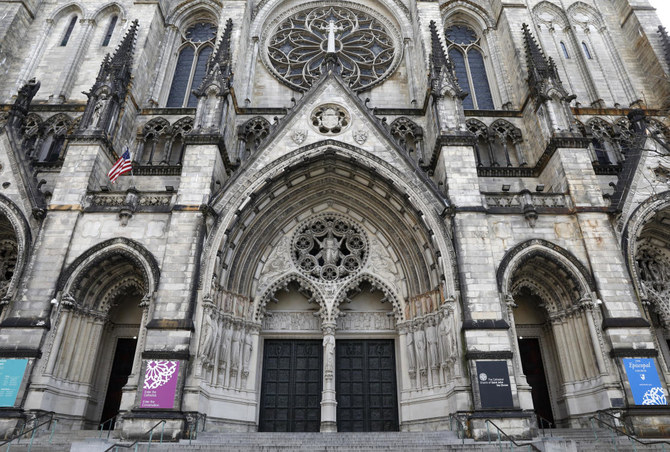
- This Easter, many Arab Christian churches are relying on the social media platform Facebook to live-stream their services
- Arab American Christian leaders say many of their parishioners will also stay at home and follow holy week services via the Internet
Sweden to send NATO troops to Latvia next year: PM
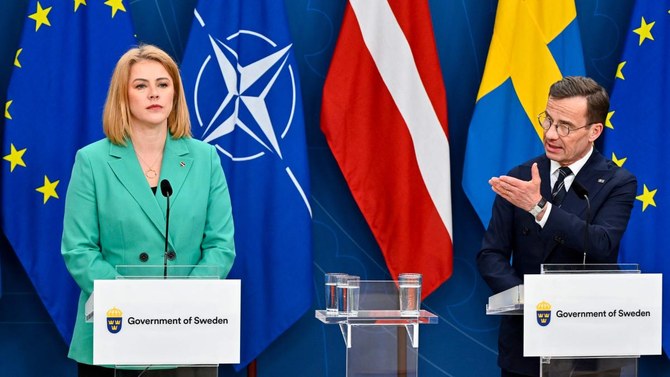
- The Swedish troop contribution was the first to be announced since the Scandinavian country joined NATO in March
- The battalion would be comprised of around 400 to 500 troops
STOCKHOLM: Sweden will next year contribute a reduced battalion to NATO forces in Latvia to help support the Baltic state following Russia’s invasion of Ukraine, Prime Minister Ulf Kristersson said Thursday.
The Swedish troop contribution was the first to be announced since the Scandinavian country joined NATO in March.
Kristersson had in January announced that Sweden would likely send a battalion to take part in NATO’s permanent multinational mission in Latvia, dubbed the Enhanced Forward Presence, aimed at boosting defense capacity in the region.
“The government this morning gave Sweden’s armed forces the formal task of planning and preparing for the Swedish contribution of a reduced mechanized battalion to NATO’s forward land forces in Latvia,” Kristersson told reporters during a press conference with his Latvian counterpart Evika Silina.
He said the battalion, which will be in Latvia for six months, would be comprised of around 400 to 500 troops.
“Our aim is a force contribution, including CV 90s armored vehicles and Leopard 2 main battle tanks.”
“We’re planning for the deployment early next year after a parliament decision,” he said.
UK police make fourth arrest after migrant deaths off France
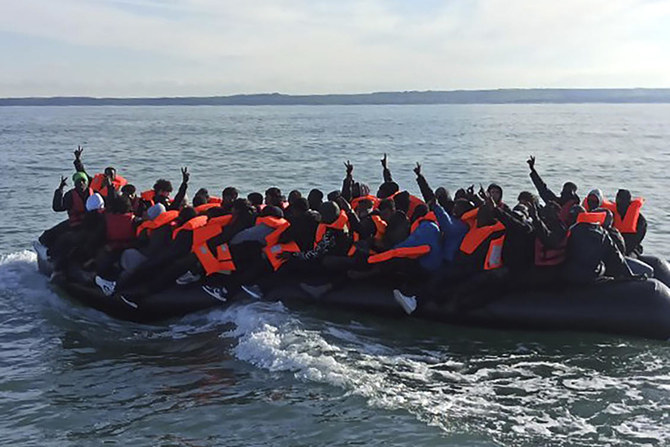
- NCA said it arrested an 18-year-old from Sudan late Wednesday on suspicion of facilitating illegal immigration and entering the UK illegally
- The latest arrest took place at Manston in Kent, southeast England, and the suspect was taken into custody for questioning
LONDON: UK police said Thursday that they had arrested another man after five migrants, including a child, died this week trying to cross the Channel from France.
The National Crime Agency (NCA) said it arrested an 18-year-old from Sudan late Wednesday on suspicion of facilitating illegal immigration and entering the UK illegally.
The arrest came as part of an investigation into the Channel small boat crossing which resulted in the deaths of five people on a French beach on Tuesday.
The NCA detained two Sudanese nationals aged 19 and 22, and a South Sudan national, also 22, on Tuesday and Wednesday, also on suspicion of facilitating illegal immigration and entering the UK illegally.
The 19-year-old has been released without charge, and is now being dealt with by immigration authorities, said the NCA.
The latest arrest took place at Manston in Kent, southeast England, and the suspect was taken into custody for questioning.
Three men, a woman and a seven-year-old girl lost their lives in the early hours of Tuesday in the sea near the northern French town of Wimereux.
They had been in a packed boat that set off before dawn but whose engine stopped a few hundred meters from the beach.
Several people then fell into the water. About 50 people were rescued and brought ashore but emergency services were unable to resuscitate the five.
Fifteen people have died this year trying to cross the busy shipping lane from northern France to southern England, according to an AFP tally.
That is already more than the 12 who died in the whole of last year.
Belgium summons Israeli ambassador over aid worker’s death
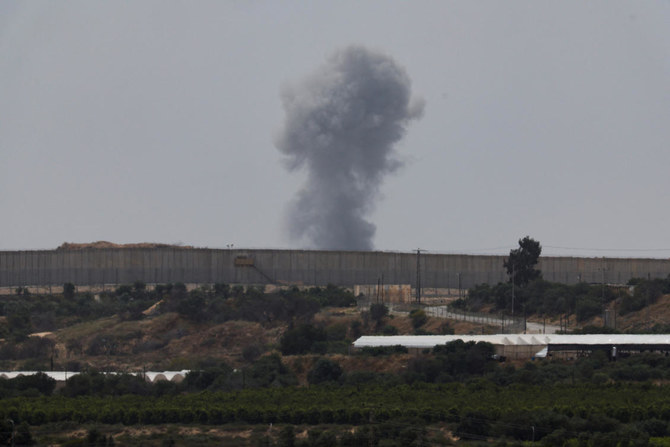
- Abdallah Nabhan, 33, along with his seven-year-old son, 65-year-old father, 35-year-old brother and six-year-old niece, were killed in Israel strike
- The airstrike hit the family home where 25 people were sheltering
BRUSSELS: Belgium said Thursday that it would summon Israel’s ambassador to explain the death in a Gaza airstrike of an aid worker with its Enabel development agency, as well as members of his family.
“Bombing civilian areas and populations is contrary to international law. I will summon the Israeli ambassador to condemn this unacceptable act and demand an explanation,” Foreign Minister Hadja Lahbib said on X.
Enabel said in a statement that Abdallah Nabhan, 33, along with his seven-year-old son, 65-year-old father, 35-year-old brother and six-year-old niece, were killed “after an Israeli airstrike in the eastern part of the city of Rafah.”
An Enabel employee & his family have been killed in Gaza. We express our solidarity with his family & colleagues.
— Hadja Lahbib (@hadjalahbib) April 25, 2024
Bombing civilian areas & populations is contrary to international law. I will summon the Israeli ambassador to condemn this unacceptable act & demand an explanation.
The airstrike hit the family home where 25 people were sheltering, including people displaced by the Israeli military operation in Gaza, Enabel said.
It said that Nabhan, who had worked on a Belgian development project helping young people find jobs, and his family were on a list Israel had of people eligible to exit Gaza, but that they were killed before being granted permission to leave.
Enabel’s chief, Jean Van Wetter, called their deaths “yet another flagrant violation by Israel of international humanitarian law.”
The health ministry in Gaza, run by the Hamas militant group, says more than 34,000 people have died in the war being waged in the Palestinian territory, most of them women and children.
Israel is conducting airstrikes and ground operations there in retaliation for a Hamas attack on October 7 that killed around 1,170 people in Israel, according to an AFP tally of Israeli figures.
Belgium, which currently holds the EU presidency, is among the European countries most vocal in condemning Israel’s operation as disproportionately deadly for Palestinian civilians.
Ukraine, Russia exchange fire, at least seven dead

- The uptick in civilian deaths came as Russian forces are pressing in hard in the eastern Donetsk region of Ukraine
- A Ukrainian attack drone left two dead in Zaporizhzhia and two more were killed by Ukranian artillery fire in Kherson
MOSCOW: Ukrainian and Russian forces exchanged drone and artillery fire on Thursday, leaving at least seven dead, regional officials on both sides of the frontline announced.
The uptick in civilian deaths came as Russian forces are pressing in hard in the eastern Donetsk region of Ukraine, ahead of events in Moscow on May 9, hailing the Soviet Union's victory in World War II.
A Ukrainian attack drone left two dead in the southern region of Zaporizhzhia and two more were killed by Ukranian artillery fire in the southern Kherson region, officials said.
The Kremlin claimed to have annexed both regions in late 2022 even though Russian forces are still battling to gain full control over them.
"A man and a woman were killed as a result of a strike on a civilian car. Their four young children were orphaned," the Russian-installed head of Zaporizhzhia, Evgeny Balitsky, wrote on social media.
He said the children would be taken into care and provided with psychological assistance.
The Russian head of the Kherson region, Vladimir Saldo, said separately that two more people were killed by Ukrainian fire in the village of Dnipryany.
The two frontline regions saw intense bouts of fighting in 2022 and the summer of 2023, when Ukraine launched a counteroffensive that failed to meet expectations in Zaporizhzhia.
The brunt of the fighting has since moved to the eastern Donetsk region, which is also claimed by Moscow as Russian territory.
The Ukrainian head of the Donetsk region, Vadim Filashkin, said three people had been killed in separate bouts of shelling in the villages of Udachne, where two people were killed, and in Kurakhivka, where one person was killed.
"The final consequences of the shelling have yet to be determined," he said.
Keralites in Gulf take ‘vote flights’ to join India’s mammoth polls
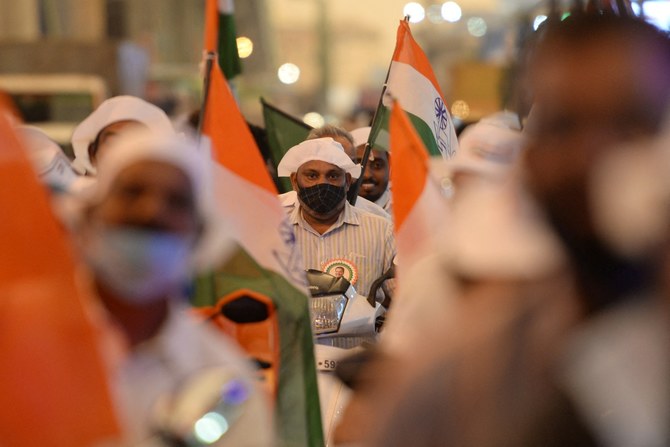
- ‘Vote flights’ are special chartered flights bringing Keralites home to cast ballots
- Kerala is the single main place of origin of Indian expats living in Gulf countries
NEW DELHI: Tens of thousands of Keralites working in Gulf countries are flying home to cast their ballots as the southern Indian state opens for voting on Friday in the world’s biggest general election.
India’s seven-phase polls started on April 19 and take place over the next six weeks, with more than 968 million people registered to vote.
Some states are completing the process in a day, and others have it spread out in several phases. Kerala is joining other 12 states, which according to the schedule go to the polls on April 26.
Indian nationals living overseas have been allowed to vote since 2011 and have to register with both the Election Commission of India and Indian embassies in their countries of residence. Their names will then appear on the voters’ list, but to cast their ballots, they still need to be physically present in their constituencies.
India has one of the world’s largest diasporas, especially in GCC countries, where at least 9 million Indian expats live and work. The southwestern coastal state of Kerala is the single main place of their origin. Some 3.5 million Keralites reside in Saudi Arabia, Oman, Kuwait, Qatar, Bahrain and the UAE.
“I think about 30,000 people have come from Saudi Arabia alone to vote. Not all of them have come on ‘vote viman’ (vote flights). Some have also come by regular flights,” said Iqbal Cheri, a marketing professional working in Dammam, who reached Kerala on Thursday.
Cheri referred to the flights that have been bringing citizens home to participate in Friday’s polls.
“They bring voters only and they are mostly chartered flights,” he said. “We have come here to vote and save our democracy and secularism. It’s an important election and we all need to vote to save the nation.”
His compatriot, Shareef Chola Paramdil, who works as a marketing head of a hospital in Dammam, said these election flights have been bringing Saudi Arabia-based Kerala voters home for the past few days.
“Last week, also three chartered flights came from Saudi Arabia,” he said.
“People who come on the chartered flights pay less compared to the regular flights, as group booking brings down the fare. Besides, these people don’t get more than a few days of leave. So, they come and cast their votes and leave the next day.”
There are 543 contested seats in the lower house of parliament. The party or coalition that wins at least 272 is going to form the government. The state of Kerala will contribute 20.
For Paramdil, the election is particularly important as a Muslim because incumbent Prime Minister Narendra Modi and his ruling Bharatiya Janata Party have been accused by the opposition and minority groups of marshaling majoritarian Hindu sentiment.
Critics say that India’s tradition of diversity and secularism has been under attack since Modi took power a decade ago and that his party has been fostering religious intolerance and discrimination.
“We want a government that does not discriminate in the name of religion, and we have been troubled by the politics of division that the government in Delhi has been practicing ever since it came to power in 2014,” Paramdil said.
Both Keralite Muslims and Hindus — like Gokul Padnabhan, a Kuwait-based professional in the oil and gas industry — see the election as an important exercise of their democratic rights.
“It’s very important to be here this time. That’s why I came for the vote,” Padnabhan said. “The vote will help us find the right person to rule us for the next five years.”
One of the organizations helping expat voters charter flights in Gulf countries is the Kerala Muslim Cultural Centre, an overseas wing of the Indian Union Muslim League.
“I feel around 100,000 people have come from the Gulf region to vote in this election,” said Ahamed Saju, head of the IUML’s student federation.
“Why they came is because this is a very crucial election this time ... Each and every vote is important. So, they thought that this time to protect our democracy, protect our constitution, protect our values and protect our secular credentials and the secular fabric of the country.”



